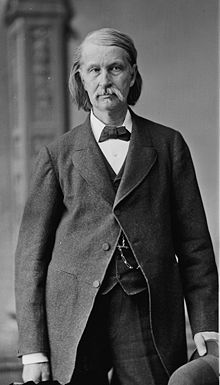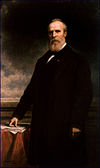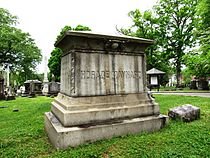- Horace Maynard
-
Horace Maynard 
28th United States Postmaster General In office
June 2, 1880 – March 4, 1881Preceded by David M. Key Succeeded by Thomas L. James United States Minister to the Ottoman Empire In office
1875–1880Preceded by George H. Boker Succeeded by James Longstreet Member of the U.S. House of Representatives from Tennessee's At-large district In office
March 4, 1873 – March 3, 1875Preceded by New office Succeeded by End of office Member of the U.S. House of Representatives from Tennessee's 2nd district In office
July 24, 1866 – March 3, 1873Preceded by Himself Succeeded by Jacob Montgomery Thornburgh In office
March 4, 1857 – March 3, 1863Preceded by William H. Sneed Succeeded by Himself Personal details Born August 30, 1814
Westborough, Massachusetts, U.S.Died May 3, 1882 (aged 67)
Knoxville, Tennessee, U.S.Resting place Old Gray Cemetery
Knoxville, Tennessee, USAPolitical party Whig, Know-Nothing, Opposition, Unionist, Unconditional Unionist, Republican Spouse(s) Laura Ann Washburn[1] Alma mater Amherst College Profession Lawyer, Politician, Professor Religion Presbyterian[2] Horace Maynard (August 30, 1814 – May 3, 1882) was an American educator, attorney, politician and diplomat active primarily in the second half of the 19th century. Initially elected to the House of Representatives from Tennessee's 2nd Congressional District in 1857, Maynard, an ardent Union supporter, became one of the few Southern congressmen to maintain his seat in the House during the Civil War. Toward the end of the war, Maynard served as Tennessee's attorney general under Governor Andrew Johnson, and later served as ambassador to Turkey under President Ulysses S. Grant and Postmaster General under President Rutherford B. Hayes.[2]
Maynard left his teaching position at East Tennessee College in the early 1840s to pursue a career in law, and quickly developed a reputation among his peers for his reasoning ability and biting sarcastic style.[2] He spent much of his first two terms in Congress fighting to preserve the Union, and during the Civil War he consistently urged President Abraham Lincoln to send Union forces to free East Tennessee from its Confederate occupiers.[3] Maynard returned to Congress after the war, but being a Republican in a Democrat-controlled state, he struggled in statewide elections.[2]
Contents
Biography
Early life
Born in Westborough, Massachusetts, Maynard was educated at Millbury Academy and later at Amherst College.[1] When Maynard entered Amherst, he puzzled his classmates by placing a "V" above his door, the meaning of which was revealed in 1838 when Maynard was named valedictorian of his graduating class.[2] In 1839, he moved to Knoxville, Tennessee, where he accepted a position as a professor at East Tennessee College (now the University of Tennessee). He initially taught in the university's preparatory (high school) department, but in 1841 he became a college-level teacher of mathematics and ancient languages.[4]
Maynard was initially disenchanted with Knoxville, which he considered backward and unsophisticated, and contemplated leaving Tennessee.[2] After he was admitted to the bar in 1844, however, he found a niche arguing cases in local courts, and decided to make the city his permanent home. Knoxville attorney Oliver Perry Temple (1820–1907), a colleague of Maynard, described Maynard as "abrupt and unamiable, and often offensive in his manners, snapping up men without hesitation."[2] This style agitated Maynard's peers, but at the same time gained their respect.
Early congressional terms
When Maynard first ran for Congress in 1853, he was ruthlessly attacked in local newspapers, and was defeated by William Churchwell. In 1857, with the Knoxville Whig backing his campaign, he captured the 2nd District's congressional seat. In his 1859 reelection campaign, Maynard easily defeated fellow attorney J. C. Ramsey, winning 67% of the vote.[5]
Maynard initially supported the Whig Party, and served as a presidential elector in 1852. After the collapse of the Whig Party, he ran for Congress on the American, Opposition and Unionist party tickets in 1857, 1859, and 1861, respectively.[4]
Secession crisis and views on slavery
Maynard's complex views on slavery reflected shifting sentiments that were common among East Tennessee Unionists. During the 1830s, Maynard, the son of an abolitionist, found slavery contemptible, calling it "a curse to the country."[5] By 1850, however, Maynard was defending the practice of slavery in letters to his father, arguing there was a "bright as well as a dark side to slavery."[5] In 1860, Maynard owned four slaves, and while he opposed secession as a congressman, he nevertheless defended slavery.[5] Toward the end of the Civil War, Maynard again adopted an abolitionist viewpoint, and supported Lincoln's Emancipation Proclamation.[5]
Along with fellow Unionists Andrew Johnson, T.A.R. Nelson, and William G. Brownlow, Maynard worked feverishly to keep Tennessee in the Union amidst the secession crisis of 1860 and 1861. In the weeks leading up to the state's June 8 referendum on secession, Maynard travelled across East Tennessee, giving dozens of pro-Union speeches. Maynard was also a member of the Knox County delegation to the East Tennessee Union Convention, which sought to create a separate Union-aligned state in East Tennessee.[5]
Civil War
 Maynard, photographed by Mathew Brady in the 1860s
Maynard, photographed by Mathew Brady in the 1860s
After the East Tennessee Union Convention adjourned in June 1861, Maynard headed for Washington, D.C. to take his seat in Congress. When Confederate forces occupied East Tennessee later that year, Maynard consistently pleaded with Lincoln to send troops to free the region, warning that East Tennesseans' "tears and blood will be a blot on your administration that time can never efface."[5] In December 1861, Maynard blasted General George H. Thomas for balking at an invasion of the region in the wake of so-called bridge-burning conspiracy, calling his efforts "disgraceful."[3] Later that month, General George B. McClellan wrote to General Don Carlos Buell:
"Johnson, Maynard, etc., are again becoming frantic, and have President Lincoln's sympathy excited. Political considerations would make it advisable to get the arms and troops into Eastern Tennessee at a very early day..."[3]
In spite of Maynard's efforts, Union troops did not enter Knoxville until September 1863. By the time Maynard returned to the city, a rift had developed among East Tennessee's Unionists between those who supported the Emancipation Proclamation (led by Maynard and Brownlow) and those who simply sought a return to the pre-war status quo (led by Nelson and Knoxville mayor James C. Luttrell).[5] In 1864, Maynard was appointed Tennessee's attorney general by Andrew Johnson, who had been installed as the state's military governor.
Postwar activities
Maynard attended the National Union Convention in 1866 and was elected to the 39th Congress as an Unconditional Unionist the same year following the readmission of Tennessee into the Union. He then served in the 40th, 41st, 42nd and 43rd Congresses as a Republican. During the 43rd Congress he acted as chairman of the U.S. House Committee on Banking and Currency. In 1868, while serving in Congress, Maynard was appointed to the Tennessee Supreme Court by Governor Brownlow to fill the vacancy created by the resignation of Samuel Milligan. Maynard held both offices simultaneously, but his right to do so was challenged in Calloway v. Strum, 48 Tennessee (1 Heiskell), 764.[6] The court in that case held that Maynard's judicial acts were valid based on the presumption that his acceptance of the Supreme Court appointment constituted a resignation of his congressional office, and that it was up to Congress to address his continued occupation of that office.
Maynard reached the height of his political career in 1873 when he defeated both Andrew Johnson and popular West Tennessee politician B. F. Cheatham in the race for Tennessee's at-large congressional district.[2] The following year, he ran for Governor of Tennessee as a Republican, but lost to James D. Porter, Jr.. He was appointed Minister to Turkey and served from 1875 to 1880 in that post. He was appointed United States Postmaster General in the Cabinet of President Rutherford B. Hayes and served from June 2, 1880 to March 5, 1881.
Maynard died suddenly from heart disease in Knoxville in 1882,[7] and was buried in Knoxville's Old Gray Cemetery.
Legacy
Maynard was remembered among his peers for his powerful intellect and sense of persuasiveness. Knoxville Journal editor William Rule wrote that Maynard was the "best read man" of East Tennessee's lawyers,[8] while abolitionist Frederick Douglass once remarked that Maynard had a "three story head."[2] Knoxville mayor Peter Staub (a Democrat) said that even though he disliked Maynard, he was so impressed with Maynard's reasoning and rhetoric that he voted for him twice.[2] Oliver Perry Temple wrote of Maynard: "Many were the persons he stung and wounded by his biting sarcasm or pungent wit."[2] Humorist George Washington Harris mocked Maynard ("Stilyards") in his story, "The Widow McCloud's Mare."[9][10]
During the 1850s, Knox County attempted to sue the newly-formed Union County, Tennessee, out of existence. Maynard successfully represented Union County, and in return, the county named its county seat, Maynardville, in his honor.[4] Horace Maynard High School served the county from 1923 until 1997, when it became a middle school.[11] During the Spanish-American War, the USS Nashville, commanded by Maynard's son, Washburn, fired the war's first American shot.[2][12] Another son, James, was president of the Knoxville-based Brookside Mills in the early 1900s.[13]
References and notes
- ^ a b East Tennessee Historical Society, Mary Rothrock (ed.), The French Broad-Holston Country: A History of Knox County, Tennessee (Knoxville, Tenn.: East Tennessee Historical Society, 1972), pp. 453-454.
- ^ a b c d e f g h i j k l Oliver P. Temple, Notable Men of Tennessee, From 1833 to 1875, Their Times and Their Contemporaries (New York: Cosmopolitan Press, 1912), pp. 137-149.
- ^ a b c Oliver P. Temple, East Tennessee and the Civil War (Johnson City, Tenn.: Overmountain Press, 1995), pp. 437-441.
- ^ a b c Kathleen Zebley, Horace Maynard, Tennessee Encyclopedia of History and Culture, accessed 9 August 2011.
- ^ a b c d e f g h Robert McKenzie, Lincolnites and Rebels: A Divided Town in the American Civil War (New York: Oxford University Press, 2006), pp. 36-37, 49, 145.
- ^ Tennessee Supreme Court Historical Society.
- ^ Death of Horace Maynard, New York Times, May 4, 1882
- ^ John Wooldridge, George Mellen, William Rule (ed.), Standard History of Knoxville, Tennessee (Chicago: Lewis Publishing Company, 1900; reprinted by Kessinger Books, 2010), p. 486.
- ^ Donald Day, "The Political Satires of George W. Harris," Tennessee Historical Quarterly, Vol. 4, No. 4 (December 1945), pp. 320-338.
- ^ George Washington Harris, Sut Lovingood: Yarns Spun By a Nat'ral Born Durn'd Fool (New York: Dick and Fitzgerald, 1867), pp. 37-47.
- ^ "Horace Maynard High School Remembered," Knoxville News-Sentinel, 10 September 1997.
- ^ Mark Barnes, The Spanish-American War and Philippine Insurrection, 1898-1902: An Annotated Bibliography (Routledge, 2010), p. xii.
- ^ Will Thomas Hale and Dixon Lanier Merritt, A History of Tennessee and Tennesseans, Vol. VII (Chicago: Lewis Publishing Company, 1913), p. 1881.
External links
- Horace Maynard at the Biographical Directory of the United States Congress
- Finding Aid for the Horace Maynard Papers — University of Tennessee Special Collections
Political offices Preceded by
David M. KeyUnited States Postmaster General
Served under: Rutherford B. Hayes
June 2, 1880 – March 4, 1881Succeeded by
Thomas L. JamesUnited States House of Representatives Preceded by
William H. SneedMember from Tennessee's 2nd congressional district
March 4, 1857 – March 3, 1863Vacant Title next held byHimselfVacant Title last held byHimselfMember from Tennessee's 2nd congressional district
July 24, 1866 – March 3, 1873Succeeded by
Jacob M. ThornburghPreceded by
NoneMember from Tennessee's At-large congressional district
March 4, 1873 – March 3, 1875Succeeded by
NoneDiplomatic posts Preceded by
George H. BokerUnited States Minister to Turkey
1875 – 1880Succeeded by
James LongstreetUnited States Postmasters General Confederal 
Federal Cabinet level Barry · Kendall · Niles · F. Granger · Wickliffe · Johnson · Collamer · Hall · Hubbard · Campbell · A. Brown · Holt · King · Blair · Dennison · Randall · Creswell · Marshall · Jewell · Tyner · Key · Maynard · James · Howe · Gresham · Hatton · Vilas · Dickinson · Wanamaker · Bissell · Wilson · Gary · Smith · Payne · Wynne · Cortelyou · Meyer · Hitchcock · Burleson · Hays · Work · New · W. Brown · Farley · Walker · Hannegan · Donaldson · Summerfield · Day · Gronouski · O'Brien · Watson · Blount
U.S. Postal Service Cabinet of President Rutherford B. Hayes (1877–1881) Vice President William A. Wheeler (1877–1881)
Secretary of State William M. Evarts (1877–1881)Secretary of the Treasury John Sherman (1877–1881)Secretary of War George W. McCrary (1877–1879) • Alexander Ramsey (1879–1881)Attorney General Charles Devens (1877–1881)Postmaster General David M. Key (1877–1880) • Horace Maynard (1880–1881)Secretary of the Navy Richard Wigginton Thompson (1877–1880) • Nathan Goff, Jr. (1881)Secretary of the Interior Carl Schurz (1877–1881)Categories:- 1814 births
- 1882 deaths
- Members of the United States House of Representatives from Tennessee
- United States Postmasters General
- United States ambassadors to Turkey
- United States presidential electors
- Tennessee Attorneys General
- Tennessee lawyers
- Tennessee Republicans
- Amherst College alumni
- People from Knoxville, Tennessee
- People of Tennessee in the American Civil War
- People from Worcester County, Massachusetts
- Tennessee Whigs
- Tennessee Unionists
- Tennessee Know Nothings
- Tennessee Oppositionists
Wikimedia Foundation. 2010.

